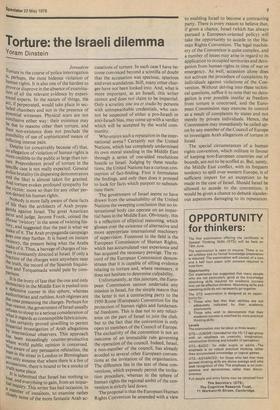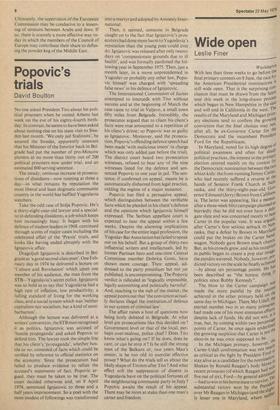Torture: the Israeli dilemma
Yoram Dinstein
Jerusalem
Torture in the course of police interrogation Is, Perhaps, the most hideous violation of human rights. It is also one of the hardest to prove or disprove in the absence of examination of all the relevant evidence by experienced experts. In the nature of things, the aCt, if perpetrated, would take place in seclUded chambers and not in the presence of Potential witnesses. Physical scars are not tnoelusive either way : their existence may ue due to reasons other than torture, and their non-existence does not preclude the possibility of use of sophisticated means of inflicting intense pain. Despite (or conceivably because of) that, no allegation of violation of human rights is more credible to the public at large than torture. Preponderant proof of torture in the specific case is not really expected. General Police brutality (in dispersing demonstrators and the like) is almost taken for granted. And torture evokes profound sympathy for the victim: more so than for any other person denied his human rights.
body is more fully aware of these facts
°I life than the architects of Arab propaPhda against Israel. The great American Jurist and judge, Jerome Frank, coined the Phrase twistory' in the sense of twisting historY, and suggested that the past is what we illake of it. The Arab propaganda campaign goes one step further. It is based on instant to -orY, the present being what the Arabs Make of it. Thus, a barrage of charges of torfture is constantly directed at Israel. If only a raeti°n of the charges were anywhere near tthe truth, the record of the Spanish Inquisilein and Torquemada would pale by coinDarison.
It is the irony of fate that the one and only de is in the Middle East is pushed into a defensive corner in this sphere, whereas tahuthoritarian and ruthless Arab regimes are .re °nes presenting the charges. Perhaps for rtnat reason, the government of Israel usually :fuses to stoop to a serious consideration of .that It regards as contemptible fabrications. has certainly proved unwilling to permit 113111partial investigation of Arab allegations Y International observers. This approach ,.rla,s been exceedingly counter-productive Were world public opinion is concerned. a.ware of any persuasive refutation, the culaan in the street in London or Birmingham "IY assume that where there is a fire of ",`cusations, there is bound to be a smoke of tru!ll some place. loll is submitted that Israel has nothing to tiasie? and everything to gain, from an impara n IncluIrY. This writer has had occasion, in eio umber of instances, to examine rather SelY some of the more fantastic Arab ac
cusations of torture. In each case I have become convinced beyond a scintilla of doubt that the accusation was specious, spurious and even scandalous. Still, many other charges have not been looked into. And, what is more important, as an Israeli, this writer
cannot and does not claim to be impartial. Only a scrutiny sine ira et studio by persons
with unimpeachable credentials, who cannot be suspected of either a pro-Israeli or anti-Israeli bias, may come up with a verdict which will be accepted by the world community.
Who enjoys such a reputation in the international arena ? Certainly not the United Nations, which has completely undermined its own moral standing in the Middle East through a series of one-sided resolutions hostile to Israel. Judging by these resolutions, the United Nations has a curious conception of fact-finding. First it formulates the findings, and only then does it proceed to look for facts which purport to substantiate them.
The government of Israel seems to have drawn from the unsuitability of the United Nations the sweeping conclusion that no international body can operate on an impartial basis in the Middle East. Obviously, this is a reflection of elliptical reasoning, which glosses over the existence of alternative and more appropriate international machinery of supervision. Foremost in the field is the European Commission of Human Rights, which has accumulated vast experience and has acquired the necessary prestige. The record of the European Commission demonstrates that it is capable of sifting evidence relating to torture and, where necessary, it does not hesitate to determine culpability.
Unfortunately, at this juncture, the European Commission cannot undertake any mission in Israel, for the simple reason that the latter is not a contracting party to the 1950 Rome (European) Convention for the protection of human rights and fundamental freedoms. This is due not to any reluctance on the part of Israel to join the club, but to the fact that the convention is only open to members of the Council of Europe. The exclusivity of the convention is not an outcome of an immutable rule governing the operation of the council. Indeed, Israel, a non-member of the council, has already acceded to several other European conventions at the invitation of the organisation. The difference lies in the text of these conventions, which expressly permit the invitation procedure, whereas in the sphere of human rights the regional ambit of the convention is strictly laid down.
The proposal is that the European Human Rights Convention be amended with a view to enabling Israel to become a contracting party. There is every reason to believe that, if given a chance, Israel (which has always pursued a European-oriented policy) will take the opportunity to accede to the Human Rights Convention. The legal machinery of the Convention is quite complex, and a number of issues may arise in regard to its application to occupied territories and derogation from human rights in time of war or emergency. As well, accession alone does not activate the procedure of complaints by individuals against violations of the Convention. Without delving into these technical questions, suffice it to note that no derogation is ever possible insofar as freedom from torture is concerned, and the European Commission may exercise its control as a result of complaints by states and not merely by private individuals. Hence, the Commission may immediately be called upon by any member of the Council of Europe to investigate Arab allegations of torture in Israel.
The special circumstances of a human rights convention, which militate in favour of keeping non-European countries out of bounds, are not to be scoffed at. But, surely, the Middle East conflict, with its frequent tendency to spill over western Europe, is of sufficient import for an exception to be made in the case of Israel. Should Israel be allowed to accede to the convention, it would be given a chance to debunk slanderous aspersions damaging to its reputation. Ultimately, the supervision of the European Commission may be conducive to a lessening of tensions between Arabs and Jews. If so, there is scarcely a more effective way today in which the members of the Council of Europe may contribute their share to defusing the powder keg of the Middle East.



































 Previous page
Previous page